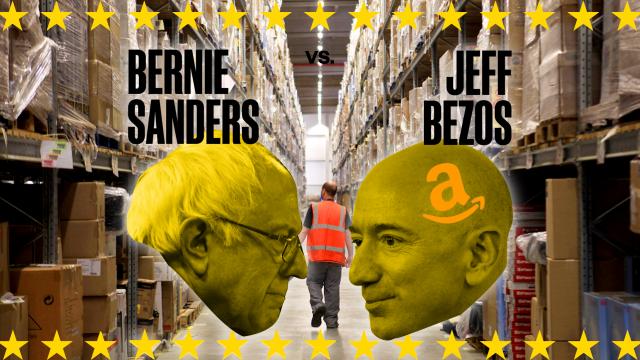
Sen. Bernie Sanders (I-Vt.) on Wednesday introduced a Senate bill — the "Stop BEZOS Act" — that would require large employers such as Amazon.com and Walmart to pay the government for food stamps, public housing, Medicaid and other federal assistance received by their workers.
The bill's name is a dig at Amazon chief executive Jeffrey P. Bezos and stands for “Stop Bad Employers by Zeroing Out Subsidies Act.” It would establish a 100 percent tax on government benefits received by workers at companies with at least 500 employees, the former presidential candidate said on Wednesday.
"In other words, the taxpayers of this country would no longer be subsidizing the wealthiest people in this country who are paying their workers inadequate wages," Sanders said at a news conference announcing the bill. "Despite low unemployment, we end up having tens of millions of Americans working at wages that are just so low that they can't adequately take care of their families."
The proposed legislation comes one day after Amazon reached $1 trillion in market cap, a milestone that cements its position as one of the world's wealthiest companies. The only publicly-traded U.S. company valued higher is Apple, with a market cap of $1.1 trillion. (Bezos, who founded Amazon, is the world's wealthiest man and owns The Washington Post.)
"Amazon is worth $1 TRILLION," Sanders tweeted Tuesday. "Thousands of Amazon workers have to rely on food stamps, Medicaid and public housing to survive. That is what a rigged economy looks like."
Amazon has fired back against Sanders and his claims that thousands of Amazon employees rely on federal benefits to make ends meet. Those figures are “inaccurate and misleading,” the company said last week, because they include temporary workers as well as those who choose to work part time.
The value of Amazon's stock has more than doubled in the past year, causing Bezos's net worth to skyrocket 69 percent to $168 billion, according to the Bloomberg Billionaires Index. The median Amazon worker, meanwhile, was paid $28,446 last year, according to company filings.
The bill follows similar legislation introduced in Congress last summer by Rep. Ro Khanna (D-Calif.). The Corporate Responsibility and Taxpayer Protection Act currently has nine co-sponsors, including Democratic Reps. Barbara Lee of California, Jamie B. Raskin of Maryland and Eleanor Holmes Norton of the District.
"All this legislation is saying, is: Taxpayers shouldn't be responsible for paying the expenses of workers employed by multibillion-dollar companies," Khanna said. "The basic premise of the American Dream is that if you work hard and you work for a company that's doing well, you should earn enough to support your family. Instead, we have an absurd situation where companies with a trillion dollars in market cap — the wealthiest in the world — with employees who don't make enough to support the basic needs of themselves and their families."
A spokesman for Sanders said the senator's office has heard from hundreds of current and former Amazon workers in recent weeks who had to rely on the Supplemental Nutrition Assistance Program, Medicaid and other government programs to cover their families' basic needs. There is no official measure of a "living wage," but the federal poverty level for a family of four is $24,600.
Denise Bennett, a former Amazon worker in Tennessee, said she made $11 an hour as a full-time employee but had to rely on SNAP benefits to make ends meet. She and her three children also lived with her parents while she was working at Amazon because, as she told Sanders' office, "I could not afford to find a safe location for my family."
Amazon, which has more than 575,000 workers, is the country's second-largest private employer, behind Walmart. The company said in a statement that it has created 130,000 jobs in the past year.
Originally published by the Washington Post













